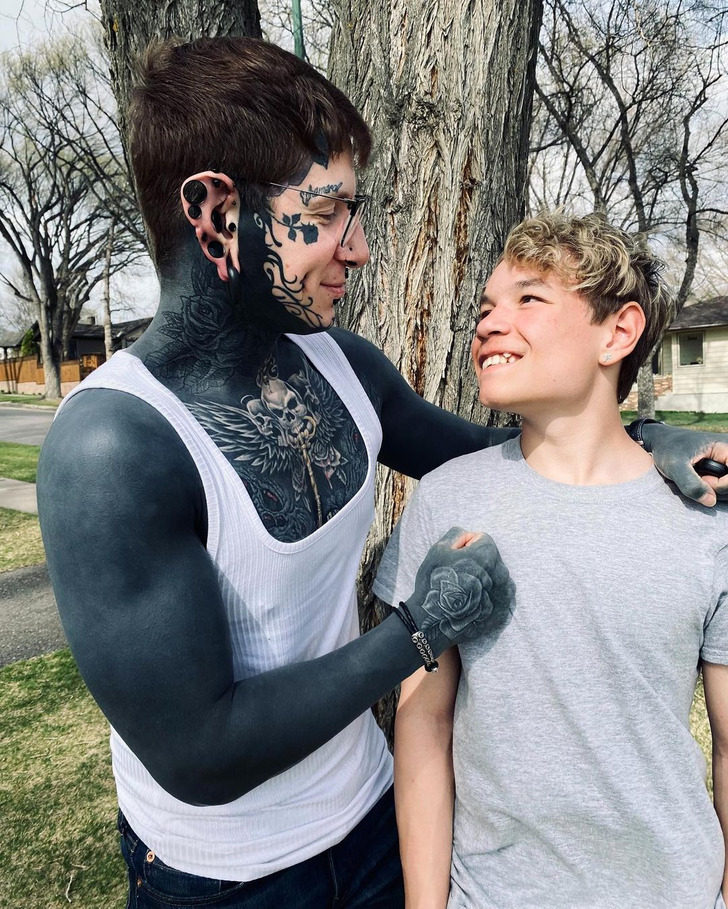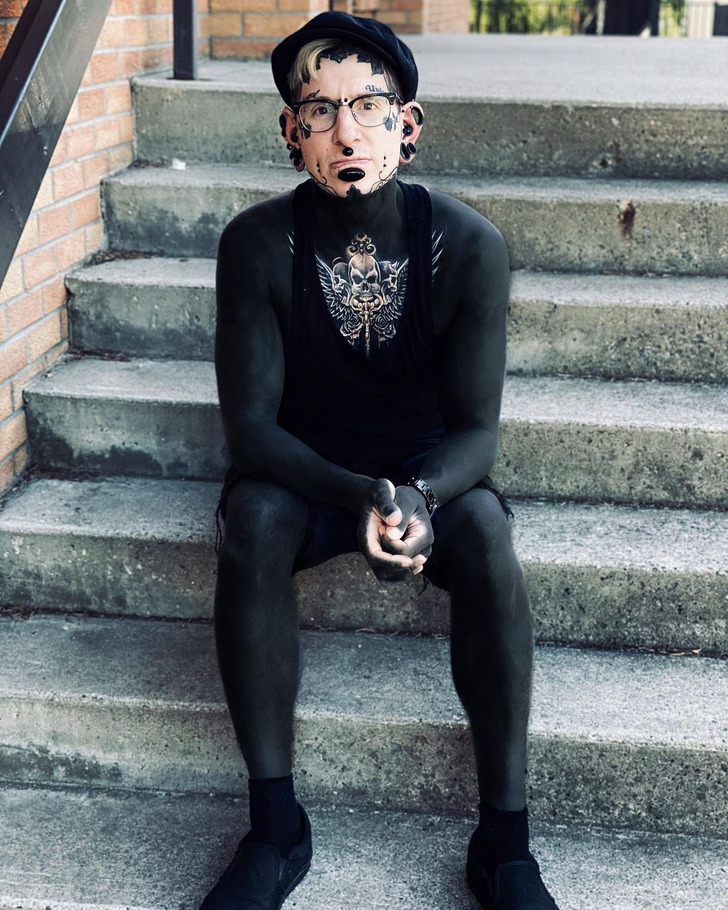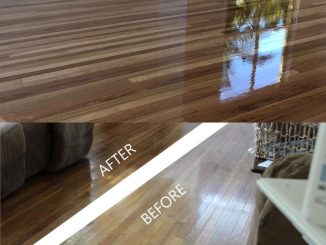With tattoos becoming increasingly popular, it is not uncommon to come across individuals who have extensive body art. Unfortunately, some people face criticism and even calls for their children to be taken from them. One such case is that of a Canadian man named Remy who has spent over $100,000 on tattoos and has encountered criticism on social media, with some people telling him he’s not a suitable father.
He doesn’t feel guilty about being a tattooed dad.

Despite his extensive amount of ink, Remy doesn’t feel guilty about his tattoos, nor does he believe they’ve changed who he is as a person or a father. He says, “Tattoos and piercings haven’t changed at all, so I wasn’t worried that my son would see me differently.”
But the man has been criticized for not being a stereotypical father.

Remy shared that he has received online comments suggesting that his son should be taken away from him due to his appearance. He stated, “I’ve had a few people say things like my son should be taken from me because of how I look, but this is only ever online.”
He continued, “My argument to that would be that if you think that way, you should never have children yourself.”
Remy added that while people stare at him in public, they only say nice things and ask questions about his tattoos. “People stare a bit [in public] but they only say nice things and ask how long it took, how I handle the pain, and generally compliment my work,” he attests.
His child is nonchalant toward his father’s tattoos.

Remy’s first tattoo was of his son’s name, but since then, he has become obsessed with getting more and more ink. His son never really noticed his tattoos.
“He’s never really noticed them, as I was already pretty different looking [when he was born in 2009] — it’s completely normal for him. As he’s gotten older, he’s become very nonchalant, and it’s actually made him more tolerant of people being different looking, I believe,” Remy says.
In fact, Remy’s son’s favorite tattoo is the eye on his stomach and chest.
Being a good parent has nothing to do with superficial looks.

While some may argue that Remy’s tattoos make him an unfit parent, it’s important to remember that body modification is a personal choice and doesn’t necessarily reflect one’s ability to be a good parent. As long as a parent is providing a safe and loving environment for their child, their appearance should not be a factor in determining their ability to care for their children.
One of Remy’s fans explained things in a wonderful way.

As one commenter on Remy’s story put it, “You give the cloth and care about what you do. As long as you can put a roof over your child’s head, it’s not anyone’s job.” Ultimately, it’s up to each individual to decide how they want to present themselves to the world, and that decision should not be used to judge their worth as a parent.
As we conclude this story of unfair judgment and inked journeys, it’s only the beginning of our exploration into the world of those living tattooed lives. In our next article, we’ll introduce you to a mom whose 800 tattoos have become a barrier to employment, shedding light on the surprising consequences of living life fully inked.
Preview photo credit ephemeral_remy / Instagram, ephemeral_remy / Instagram
23 Backhanded “Compliments” That Are Actually Insults

Everyone has been guilty of giving compliments that turn out to be less-than-sincere upon closer inspection. However, backhanded “compliments” are some of the worst, especially since they’re disguised as sweet remarks. It’s important for friends to be honest with each other, of course, but couching hard truths in fake compliments is rarely the way to go. (Unless you’re auditioning for a Real Housewives franchise, of course, in which case you can carry on.) If you’re ever on the receiving end of a backhanded compliment from a friend, the real meaning might not even sink in until hours, or even days, later.
While backhanded compliments typically stem from the speaker’s own insecurities, that doesn’t make them any less hurtful, says Sherese Ezelle, LMHC, LCPC, a licensed behavioral therapist. And when they come from a friend, a backhanded compliment is likely to sting even more — and may even damage your relationship.
Backhanded compliments run the gamut from clueless comments to rude remarks, and can also be a form of microaggression, Ezelle says. If it seems like your pal has crossed a boundary, she recommends disputing their comment in the moment by calmly asking for more info. “More often than not, to challenge them on the spot allows for the individual delivering the ‘compliment’ a chance to defend or further explain their intent,” Ezelle tells Bustle. “You want to be sure to give an opportunity for conversation so that growth can happen and friendships can be preserved.”
Of course, different friendships have different dynamics. Some close friends tease each other mercilessly and, as long as everyone’s on the same page, it tends to be OK. That said, it’s alright to recognize when something feels more hurtful than funny, or more like passive-aggressiveness than silly banter, Ezelle says. If backhanded compliments seem to be a habit rather than an exception, you can always tell your friend to buzz off — or look for a new friend circle.
These 23 backhanded compliment examples can help remind you of what a barely-concealed dig really sounds like. That way, the next time your friend claims to love your outfit or announces that they find your apartment “cozy”, you’ll know exactly how to handle it.
1. “Your Instagram Makes You Seem So Fun!”
Why it’s backhanded: On the one hand, it’s good to know all your careful filtering and captioning haven’t been in vain. But when your friend says your Instagram seems fun, they may be implying that the real you is much less interesting than the image you’re trying to project.
How to respond: “Because I am fun!”
What they could have said instead: “I’m so inspired by the way you curate your feed. It really shows off your creative side.”
2. “You Look So Great In That Photo. I Can’t Even See Your Acne!”
Why it’s backhanded: The nice compliment is immediately weighed down by the acne comment. They’re basically saying you typically have a flaw, but in this photo, you only look great because that flaw is removed. “It would be particularly hurtful if you also had an insecurity about your complexion,” says Sarah Dumoff, LCSW, a psychotherapist and founder of private practice here/now.
How to respond: “Thanks. I love this picture too, though I feel good in photos even when my skin isn’t ‘perfect.’”
What they could have said instead: “Omg, you look amazing!”
3. “I Didn’t Expect You To Get The Job. Congratulations!”
Why it’s backhanded: When a friend makes a point of mentioning their low expectations, it takes away from their congratulations.
How to respond: “I worked really hard for this. Go me!”
What they could have said instead: “I was rooting for you and am so relieved it went well!”
4. “You’re So Independent. It’s No Wonder You Haven’t Found Someone Yet.”
Why it’s backhanded: Among all the things ambitious people are tired of hearing, this is probably the most common. In theory, such a remark compliments your sense of autonomy; in practice, it implies that your independence is driving potential significant others away. As an added bonus, it perpetuates the idea that you have to compromise your sense of independence in order to be attractive. Yikes.
How to respond: “Yup! And I’ll know someone’s right for me when they respect that.”
What they could have said instead: “If you ever want to get back into the dating pool, I know someone’s going to fall immediately for your drive.”
5. “I Love How You Don’t Care How You Come Across.”
Why it’s backhanded: Your friend may profess to love your devil-may-care attitude, but what they’re really saying is that they think you’re too “out there.” Either that, or they’re making a salty comment because they’re envious of your laid-back attitude.
How to respond: “Yes! It’s taken a lot of work to get my confidence to this level. I try not to focus on what others think anymore.”
What they could have said instead: “You always seem so confident and relaxed. Tell me all your secrets.”
6. “I Wish I Was As Chill As You About All This Clutter.”
Why it’s backhanded: The real translation may be, “Your place isn’t cleaned to my exact standards and I need you to know that.” Regardless of their intention, it’s rude to make comments when you’ve been invited into someone’s private space.
How to respond: “Really? What would you do differently?” Sometimes asking someone to explain their comment is a way to get them to pause, reflect, and realize they’re being mean.
What they could have said instead: “Thanks for having me over!”
7. “That New Haircut Looks So Much Better Than Your Old One.”
Why it’s backhanded: They’re right — your new ‘do does look fabulous. But no need to be rude about what you looked like literally an hour ago. It may also make you wonder how long they’ve secretly disliked your hair.
How to respond: “I’m all about changing up my look. I’ve loved all my hairstyles and this one’s great, too.”
What they could have said instead: “Wait, this so, so good.”
8. “I Love How You’ll Just Wear Anything.”
Why it’s backhanded: If you’re getting ready together, chances are this comment is constructive and your friend is trying to prevent you from leaving the house in a not-so-great look. If they make this comment once you’re already out, however, that’s when it’s officially rude — and it might even plant a seed of self-doubt that ruins your whole night.
How to respond: “Is that a hint? What’s wrong with my outfit?” You can be honest with each other, laugh it off, and ask if they’d like to offer some advice.
What they could have said instead: “Hold up, hold up. Do you still have those wide-leg pants? Those would be perfect for tonight.”
9. “I Would Never Be Able To Pull Off That Outfit!”
Why it’s backhanded: While it sounds like they’re admiring your style, your friend is likely saying they wouldn’t be caught dead in anything similar.
How to respond: “Thanks, yea. I’ve been feelin’ myself lately. I’m all about the cargo pants trend. Can you believe they’re back?” This is a way to brush off their comment and show your friend that your “weird” look is deliberate — and fashionable.
What they could have said: “Ugh, I can’t keep up with trends. Can you share your Pinterest with me?”
10. “You’re So Charming When You Make An Effort.”
Why it’s backhanded: Great! You’re being charming and suave right now. Mission accomplished. But what about when you’re lounging in your soft pants? Your friend is kind of saying that you’re not usually this charismatic.
How to respond: “I don’t always feel the need to be ‘on’ around my close friends, but sure, I can pull out the charm when need be.” You can also mention that their comment was hurtful. Remember, when in doubt, call it out.
What they could have said: “Bestie, you’re a shining star of wit and charm.”
11. “You Look So Professional With Your Hair Straight.”
Why it’s backhanded: Talk about microaggressive “complimenting” styles. On one end of the spectrum, they’re announcing that they believe you usually look bad or unkempt. On the other, they’re saying curly or natural hair is somehow unprofessional. And that’s not OK.
How to respond: “Well, I’m glad to know that you think my natural hair makes me look so unprofessional.”
What they could have said instead: Nothing. Or, “Did you do something different with your hair?”
12. “I Wish I Didn’t Have Any Responsibilities Like You.”
Why it’s backhanded: People might be inclined to say this to their friends who live with their parents or to those who don’t have kids. Living rent-free or child-free can be less stressful than many alternatives, but that doesn’t mean anyone’s life is totally carefree or without responsibility. Saying otherwise is passive-aggressive at worst and presumptuous at best.
How to respond: “Oh wow, do I make it look that way? I have a million plates spinning at once. How are things going on your end?” This will get to the real root of the issue, which is that they’re overwhelmed.
What they could have said instead: “Do you have any spare time to listen to me vent? I’ve been so stressed lately.”
13. “Your Place Is So Cozy.”
Why it’s backhanded: Calling someone’s apartment “cozy” is often code for “super tiny” or even “so tiny I don’t understand how you live here.” It’s also condescending since not everyone can afford a sprawling abode — or wants to live in one. It just isn’t what you want to hear when you’ve invited folks over for a housewarming.
How to respond: “Thank you! I put a lot of work into the decor. Wait, did you see my record player over here?”
What they could have said instead: “Thanks so much for having me over! I always love how you decorate. Oh! I brought a quiche.”
14. “You’re Coping With This So Much Better Than I Thought You Would.”
Why it’s backhanded: You’re literally on your couch in a onesie surrounded by tissues and rubbing at your puffy eyes — and this is better than what your friend thought? How did they expect you to deal with a breakup? You might not want to know.
How to respond: If you can muster some cheekiness, say, “Thanks for the vote of confidence, pal.” If you’re too upset say, “I just need someone to listen to me, if that’s OK.” Also, side note: If a certain friend isn’t supporting you the right way during a tough time, try reaching out to someone else. Another friend, family member, or therapist may be a better bet.
What they could have said instead: “What you’re going through is one of the toughest things ever. You’re handling it so well, but it’s also OK if you need to take more time for yourself.”
15. “You Look So Much More Awake With Makeup.”
Why it’s backhanded: Your friend may be trying to give you a compliment, but this one sends the message that you usually look bad or tired whenever you deign to go outside without blush or mascara. It might be their way of judging — or they simply might not realize why it’s a rude thing to say.
How to respond: “Wait, what do I normally look like?”
What they could have said instead: “I need that blush. Where’d you get it?”
16. “You Look Refreshed Today. I Almost Didn’t Recognize You!”
Why it’s backhanded: According to psychologist Dr. Roberta T. Ballard, Ph.D., this is a common backhanded compliment. It’s something you might hear from an office friend who means well, but doesn’t realize they’re implying you usually look messy or tired. Not to mention, it’s never smart to comment on someone’s appearance, especially if you don’t know what’s going on with their health or personal life.
How to respond: “Thanks. Guess it was that extra cup of coffee I had today.” And leave it at that.
What they could have said instead: “That color blue looks amazing on you.”
17. “You’re So Chill In Your Relationship.”
Why it’s backhanded: “It may be innocent admiration of your patience in your relationship, or it may feel like something else is being implied,” says Lauren Spinella, LPC, a licensed mental health therapist and owner of Peaceful Path Counseling. Are they really impressed by your patience during a tough time in your relationship, or are they implying you’re a doormat?
How to respond: “Do you feel like I’m too chill?” According to Spinella, it’s totally fair to ask for some genuine clarification in a non-accusatory way. That’ll open the door to a deeper convo.
What they could have said instead: “I really admire how patient you are. I’m also a little concerned that you’re dealing with so much and want to make sure you’re OK.”
18. “You Look Great For Your Age!”
Why it’s backhanded: While this one’s often said with the best of intentions, it’s steeped in ageism and the idea that you can only look good if you look young. “Sometimes the person giving the backhanded compliment might not have the intention of saying something hurtful, however, the impact is still there,” says therapist Emily Sharp, MA, LCAT, ATR-BC, RYT-200.
How to respond: “I’m sure you didn’t intend to, but when you make comments about my appearance it makes me uncomfortable.” Sharp says this will get the message across in a diplomatic way.
What they could have said instead: “You look great!”
19. “You’re So Articulate.”
Why it’s backhanded: Calling you articulate is a way to express shock that you said something intelligent. It has the same vibe as, “Wow, I didn’t expect you to be good at this.” The “you’re so articulate” comment also comes with a long history of racism, especially when aimed at Black people, Ballard says.
How to respond: “What did I say that surprised you?” Again, asking someone to explain their comment is a subtle way of calling them out.
What they could have said instead: Nothing. Or something like, “It’s always such a pleasure to talk to you. I’m glad we ran into each other.”
20. “You’re So Pretty. I Don’t Get Why You’re Still Single.”
Why it’s backhanded: This backhanded compliment can send your brain swirling through a list of possible meanings. Are they saying something else is wrong with you? Or that you’re incomplete until you meet a partner? Whatever it is, it won’t feel good.
How to respond: “How are the two related?”Depending on the type of relationship you have with your friend, you can straight up call them out or ignore them, Sharp says. “You can also respond to a portion of the backhanded compliment that feels genuine, in order to maintain positivity,” she tells Bustle. “Everyone handles these situations differently, but the important part is validating your feelings for yourself.”
What they could have said instead: “We haven’t chatted about our dating lives in forever! Are you talking to anyone or nah?”
21. “I Love Your Nails. It Must Be Nice To Have So Much Extra Time In Your Day To Pamper Yourself.”
Why it’s backhanded: “This may be an innocent comment,” Spinella tells Bustle. “But it’s also understandable for someone to be put off by hearing it. You might think, are they implying that I don’t have a lot going on or that I am prioritizing the wrong things?”
How to respond: “What do you mean?” While it’s often possible to glean the intent of a backhanded compliment, Spinella says it’s best to ask for clarification, especially if the words hurt.
What they could have said instead: “I love how you did your nails! It can be so hard to prioritize self-care with a busy schedule. Maybe you can help me do the same?”
22. “You Look So Comfortable!”
Why it’s backhanded: This isn’t a real compliment, says wellness coach Dr. Cali Estes. Instead of saying what they really think, it’s a roundabout way for your friend to indicate that they don’t like your outfit or that they think it’s inappropriate for a situation.
How to respond: “Thanks! I’m so grateful to be comfortable so I can fully enjoy myself at this wedding.”
What they could have said instead: “I love your outfit. I really wish I would have chosen something more comfortable, too.”
23. “You’re Incredible For Working That Hard! I Could Never Leave My Cat Alone All Day.”
Why it’s backhanded: While it feels like they’re complimenting your work ethic, what they’re actually doing is commenting on your choices as a caretaker. This one’s also commonly aimed at new moms, according to Dr. Anisha Patel-Dunn, DO, a psychiatrist and chief medical officer of LifeStance Health.
How to respond: “What do you mean by that?” Patel-Dunn recommends asking for more info. For instance, “Ouch, I feel a bit hurt by that comment. Can you clarify what you mean because this is what I heard…”
What they could have said instead: “You’re the queen of getting stuff done. How do you do it?”



Leave a Reply